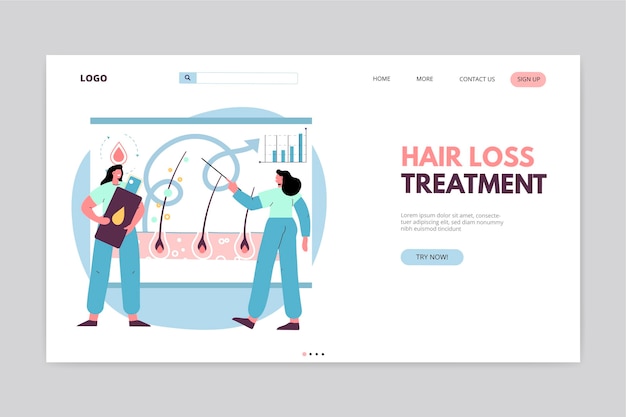
Male androgenetic alopecia (MAA), also known as male pattern baldness, is the most common type of hair loss in men, affecting about 30-50% of men by the age of 50. It typically follows a predictable pattern, starting with hair loss at the temples, mid-frontal scalp, and crown. While it’s a relatively minor dermatological condition, it can still affect self-esteem. Additionally, MAA has been increasingly linked to arterial stiffness and cardiovascular disease.
This guide will help you understand common concerns about hair loss in men, providing practical tips and insights to help you manage and cope with it effectively.
### Recognizing Hair Loss in Men
Hair loss in men often comes with noticeable signs that indicate decreasing hair density and overall scalp health. These include:
– Receding hairline
– Thinning at the crown
– Increased hair shedding
– Widening of the part line
– Miniaturization of hair strands
– Patchy or circular bald spots
If you’re experiencing any of these signs, it’s a good idea to consult a dermatologist for evaluation and advice.
### Possible Complications Linked to Hair Loss
Hair loss isn’t just a physical issue—it can have emotional and psychological effects too. Some common complications include:
1. **Reduced Self-Esteem**
Visible hair loss can hurt a man’s confidence, making him feel self-conscious and possibly leading to social withdrawal.
2. **Stress and Anxiety**
Losing hair can be frustrating and worrisome, which might trigger stress or anxiety. Unfortunately, stress can further contribute to hair loss, creating a loop that’s hard to break.
3. **Emotional Distress**
Hair loss may lead to feelings of sadness or even depression. If these emotions become too overwhelming, seeking professional help is important for mental well-being.
### Causes of Hair Loss in Men
Understanding what’s causing hair loss is the first step in addressing it effectively. Some common causes include:
1. **Androgenetic Alopecia**
This is the main cause of hair loss in men and is often hereditary. It results in thinning hair follicles and affects overall hair health.
2. **Hormonal Imbalances**
High levels of dihydrotestosterone (DHT), a hormone that shrinks hair follicles, can lead to hair loss over time.
3. **Scalp Infections**
Conditions like itching, redness, and inflammation due to infections can weaken hair follicles, causing hair to fall out.
4. **Poor Nutrition**
Lacking vitamins and minerals like iron, zinc, or biotin can harm hair health, leading to increased hair fall.
5. **Stress and Exhaustion**
Both physical and psychological stress can disrupt the hair growth cycle, contributing to more noticeable shedding and thinning.
### Effective Solutions to Tackle Hair Loss
There are a range of treatments available to help slow down hair loss, stimulate growth, and improve hair health:
1. **Medications**
FDA-approved options like minoxidil and finasteride can help. Minoxidil promotes hair growth, while finasteride works to reduce DHT levels.
2. **Hair Transplant Surgery**
A hair transplant involves moving follicles from areas with thicker hair to bald or thinning areas.
3. **Low-Level Laser Therapy (LLLT)**
This non-invasive procedure uses lasers to boost blood flow to hair follicles, encouraging regrowth and healthier hair.
4. **Platelet-Rich Plasma (PRP) Therapy**
PRP therapy involves injecting plasma from your own blood into your scalp. This plasma is rich in growth factors that support hair regrowth and thickening.
### Simple Home Remedies for Hair Health
Adding a few natural remedies to your routine can support medical treatments and promote healthier hair. Here are some approaches you can try at home:
1. **Scalp Massage**
Regular massages improve blood circulation to hair follicles, which can help strengthen them. Using oils like coconut or almond oil can enhance the benefits.
2. **Aloe Vera**
Aloe vera gel can soothe the scalp, reduce irritation, and boost overall hair health with its vitamins and enzymes.
3. **Onion Juice**
Onion juice is rich in sulfur, which supports hair growth. Apply it to your scalp, leave it for 30 minutes, and rinse thoroughly.
4. **Balanced Diet**
A diet rich in proteins, fruits, vegetables, and healthy fats provides the essential nutrients your hair needs to stay strong and healthy.
### Final Thoughts
Hair loss in men can be challenging to deal with, but understanding its causes and treatment options can make all the difference. By addressing the signs early and considering both medical treatments and natural remedies, you can take steps to maintain healthier hair. Consulting a healthcare expert is always recommended for personalized solutions tailored to your situation.
### Common Questions
1. **Can stress cause hair loss in men?**
Yes, stress can disrupt the natural hair growth cycle, causing more hair to fall out or shed.
2. **Are there natural remedies for hair loss?**
Absolutely. Remedies like scalp massage, aloe vera, and onion juice can complement medical treatments and improve hair health.
3. **Does diet affect hair health?**
Yes, eating a diet rich in essential nutrients is crucial for maintaining healthy hair. Poor nutrition can contribute to hair loss.